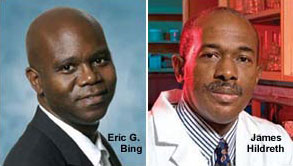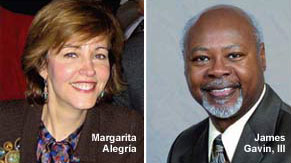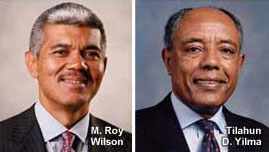Contents
News from NCRR
Researchers Named Health Ambassadors

(Photos by Paul Antico, Charles R. Drew University of Medicine and Science on the left and Meharry Medical College on the right)
NCRR-funded researchers Eric G. Bing and James E. K. Hildreth were among the 27 prominent scientists named as Ambassadors by the Paul G. Rogers Society for Global Health Research. The Rogers Society, which advocates for greater U.S. investment in global health research, announced its inaugural group of Ambassadors in November. These prominent scientists will be involved in public outreach and advocacy to convey the importance of global health research to the nation.
Bing is an assistant professor of psychiatry at Charles R. Drew University of Medicine and Science. He is also an epidemiologist with extensive expertise in HIV and the director of the Drew Center for AIDS Research, Education, and Services. The Center develops domestic and international programs to combat and treat HIV. Through the Center, Bing oversees programs in Angola, Namibia, and Rwanda aimed at preventing and treating HIV. Bing’s research focuses on developing and evaluating interventions that aim to improve the health care for disadvantaged populations, particularly those affected by alcohol and drug problems, HIV, and mental illness.
Hildreth is the director of the Meharry Center for Health Disparities Research in HIV at Meharry Medical College. The Center examines biological factors that may explain racial disparities in HIV infection and studies behavioral factors that place African Americans at a higher risk for the disease. Hildreth’s research focuses on the relationship between HIV and cholesterol, a necessary component of HIV transmission. He is developing vaginal creams that can extract cholesterol from HIV thus blocking infection during sexual intercourse. (See “Exploring the Potential of HIV Microbicides.”) Hildreth is the former chief of the division of research at the National Center on Minority Health and Health Disparities at NIH.
The Paul G. Rogers Society for Global Health Research was established in July 2006 by Research!America.
Investigators Receive Greenwood Award
A scientist studying diabetes and one whose work focuses on mental health were the winners of the 2006 Greenwood Awards. The awards are presented biennially through the NCRR-funded Research Centers in Minority Institutions (RCMI) Program in recognition of research excellence involving minority health issues or long-time meritorious service to minority institutions.

(Photos by Thomas McGuire on the left and Morehouse School of Medicine on the right)
Margarita Alegría was recognized for her research on disparities in mental health and substance abuse services for Latinos and other minority populations. James R. Gavin, III was honored for his commitment to improving the management of chronic diseases, especially diabetes, in under-served groups.
Alegría, a former RCMI investigator, is a psychology professor at Harvard Medical School and the director of the Center for Multicultural Mental Health Research at Cambridge Health Alliance. Her research focuses on conceptual and methodological issues involving minority populations, risk behaviors, disparities in service delivery, and health services research. Alegría also has been a council member of the American Public Health Association and has served as faculty for various National Institute of Mental Health training programs.
Gavin is a clinical professor of medicine at Emory University School of Medicine and president of MicroIslet, Inc., a company developing cell transplantation therapies for patients with diabetes. He also is the former president of the Morehouse School of Medicine in Atlanta. He has held numerous leadership positions. He is the former president of the American Diabetes Association, former scientific officer at the Howard Hughes Medical Institute, a member of Duke University’s Board of Trustees, and a former member of the Board of Trustees for the Robert Wood Johnson Foundation. Gavin also has served on numerous NIH advisory committees including the National Diabetes Advisory Board.
The awards are named in honor of the late researcher and administrator Frederick C. Greenwood, who did much to increase the ranks of minority scientists and promote research on health issues that affect ethnic minorities. They were presented at the Tenth RCMI International Symposium on Health Disparities, held in Puerto Rico in December 2006.
Five Members Appointed to NCRR Advisory Council
The National Advisory Research Resources Council, which advises NCRR on policies and programs and performs second-level peer review of grant applications, has five new members. The new appointees are:
Kevin B. Johnson, associate professor of pediatrics, vice chair and associate professor of biomedical informatics at Vanderbilt University. Johnson’s research lies at the intersection of clinical informatics and medicine. His areas of study include developing and evaluating computer-based software to record patient encounters and electronic prescribing systems to assist with ambulatory order entry and clinical decision support.
Thomas J. Rosol, dean of the college of veterinary medicine at The Ohio State University. Rosol studies hormones and cytokines related to cancer. He is known for his discovery of parathyroid hormone-related protein in multiple animal cancers. He also has made contributions to the study of bone metastasis and the metabolism of calcium and bone, and he has developed mouse models of human and animal cancers.
Richard Rudick, director of the Mellen Center for Multiple Sclerosis Treatment and Research; chairman of the division of clinical research; and Hazel Prior Hostetler professor of neurology at the Cleveland Clinic Foundation. Rudick researches the pathogenesis and treatment of multiple sclerosis (MS). He is also involved in the study of new outcome measures for MS clinical trials.

(Photos courtesy of Vanderbilt University [Johnson], J. R. Harvey, College of Veterinary Medicine, Ohio State University [Rosol], The Cleveland Clinic [Rudick])
M. Roy Wilson, chancellor of the University of Colorado at Denver and Health Sciences Center. Wilson is a skilled administrator in the health sciences field. He is the former president of the Texas Tech University Health Sciences Center and vice president for health sciences at Creighton University. His interests include glaucoma research, minority health, and health disparities.

(Photos courtesy of University of Colorado at Denver [Wilson], University of California, Davis [Yilma])
Tilahun D. Yilma, distinguished professor of virology and director of the International Laboratory of Molecular Biology for Tropical Disease Agents at the University of California, Davis. Yilma’s research focuses on the development of a vaccine against HIV as well as the development of recombinant vaccines for major diseases of livestock.



